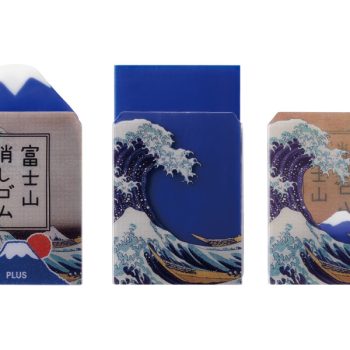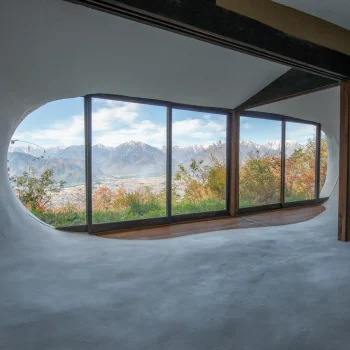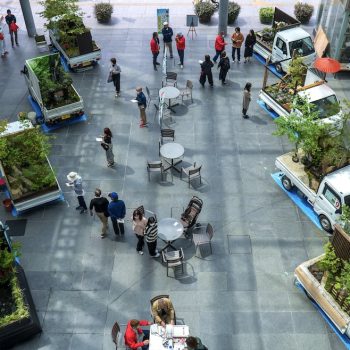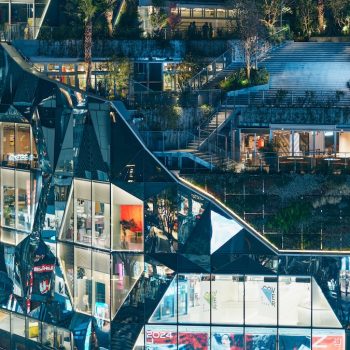We are only guests on this planet. “In the day after humans disappear, nature takes over and immediately begins cleaning house – our houses,” wrote Alan Weisman. And that’s exactly what happened in Fukushima where, 6 years ago, residents were forced to evacuate due to the nuclear disaster that unfolded in the wake of the Great East Japan Earthquake.
Tetsuro Takehana, who spent 10 years in Fukushima as a child and is now a staff photographer for the Asahi, recently visited the “difficult-to-return zones” to capture its current state. “It was as if time had stopped,” he says. “And yet the grass and trees continue to grow.”
Indeed, in striking aerial footage captured by the photographer, the resilience and tenacity of mother nature is on full display, and we see how quickly the trees, grass and vines have reclaimed the earth. Cars appeared buried in a sea of green, weeds grow from cracks in the parking lot like pulsing veins and rampant vines have climbed to the roofs of houses and condominiums. It won’t be long before this land is completely swallowed up.

all photographs courtesy Tetsuro Takehana / The Asahi




























August 2, 2017 at 7:28 pm
Reminding us once again that there is no need to worry about environmental sustainability. The environment can take care of itself. It is the survival of the human species that’s not guaranteed.
August 2, 2017 at 8:06 pm
There’s no need to worry…. as long as human beings are not in the picture.
August 3, 2017 at 7:35 pm
This comment is simply inane, facile and unbelievably insensitive.
August 2, 2017 at 10:20 pm
iT Is tHe suRvIVaL oF thE hUmaN sPeCiEs tHat’s nOt GuARanTEed
August 2, 2017 at 10:54 pm
Just because nature can take care of itself it does not mean we humans can treat it with wanton carelessness.Fukushima example ought to invoke great sadness in our hearts.
August 3, 2017 at 3:29 am
I think you are missing the point here. Of course, the planet doesn’t care about if humans survive or not, but environmental sustainability as a concept is directly linked to human beings – the sustainability of an environment that allows human habitation – that is what needs to be sustained. Humans have an impact on the environment no doubt – this can be negative (check the radiation levels in those deserted towns for proof) or positive in that it can influence how sustainable our time is on earth.
August 3, 2017 at 4:19 am
Nope, the environment doesn’t always take care of itself. Just ask Nauru.
August 3, 2017 at 9:35 am
plants still grow everywhere dude. That doesn’t mean we don’t have to worry about ecological sustainability 😛
August 3, 2017 at 3:15 pm
It looks like the salt left from the tsunami is helping the plants grow.
August 5, 2017 at 6:52 am
Not many inland plants can tolerate high salinity to be honest. It usually has the opposite effect and inhibits their growth, if not killing them outright.
August 4, 2017 at 7:13 pm
Kudzu everywhere!
August 6, 2017 at 11:53 am
A very familiar sight to those of us in the Southern US, but I hadn’t realized it behaves that way in its native environment.
August 7, 2017 at 1:24 pm
Interesting photo’s. Nature can always heal itself if left alone to do as it always does. You have to wonder at the wisdom of our modern era. You have to wonder if we have collectively lost our minds in a high-tech delusion. You have to wonder if we haven’t all become slightly deranged in our pursuit of a non-sustainable consumptive lifestyle.
We have forgotten the logic of our ancestors, who would have wondered at the bizarre attitude that see’s it as okay to build a nuclear power plant anywhere close to such a changing environment as the shoreline of the ocean. They would have been aghast at our logic in building anything as massive and immovable as our modern cities along coastlines.
Yet we continue to do exactly this. We do all of it in blithe disregard of the fundamental reality that the planet is a living, dynamic, thing. Ever changing without regard to our need. We continue to carry on with little regard for the impact and longer term viability of all that we do. We carry on until implacable, non-human, forces rise up and smack us in our myopic faces.
Will we ever learn? Perhaps. With our machine eye’s, which encircle and envelope this planet we can see more clearly the geologic forces at work. Indeed we can see that we have become such a force in our own right. Maybe we can learn to create a more sustainable, longer term, civilization than we have to date. One that acknowledges the reality of all the other forces continually at work in shaping our planet.
Highlow
American Net’Zen
August 7, 2017 at 9:50 pm
What about the radioactive waste still pouring into the ocean. Will that “take care of itself”?
August 11, 2017 at 12:46 am
Yes, Gilda, it does. There is more radioactive waste in the ocean than you would imagine, and not from Fukushima. Plenty of other waste, too, and a lot of it is from nature itself. The ocean is especially good at diluting the pollution and minimizing the impact. That does not give us license to be bad stewards, but please don’t confuse politics with actual stewardship of nature.
Remember, media is a business, not a public service. Politics doubly so. Sadly, scientists are regularly bought and paid for via government grants; if they want the grant money to keep flowing, the “results” have to make the grantor happy.
August 25, 2017 at 9:32 pm
You are so right.